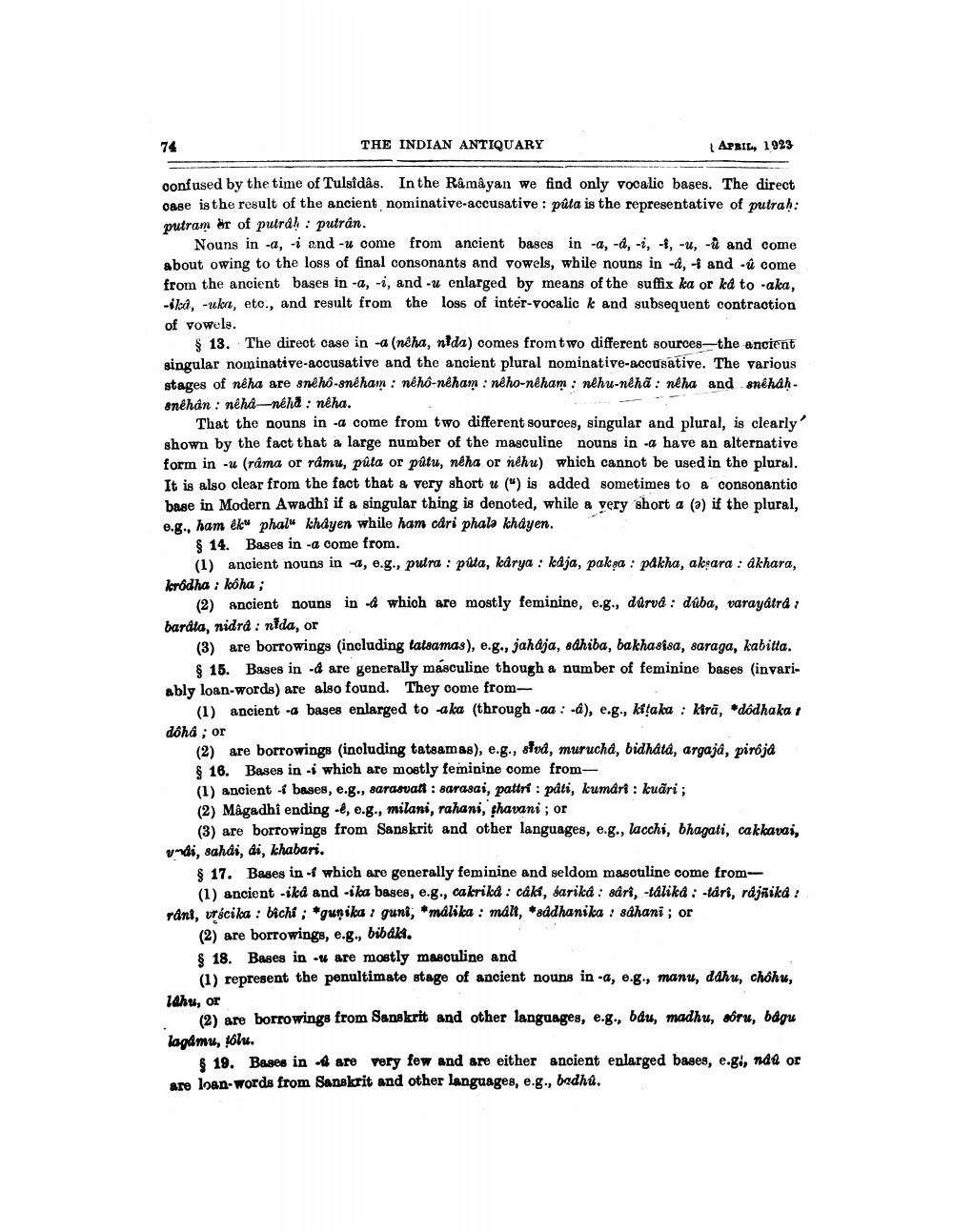________________
74
THE INDIAN ANTIQUARY
APRIL, 1923
confused by the time of Tulsidas. In the Ramayan we find only vocalic bases. The direct gage is the result of the ancient nominative-accusative : puta is the representative of putrah: putram er of putrah : putran.
Nouns in -a, -i and -u come from ancient bases in -a, -a, -, -, -u, - and come about owing to the loss of final consonants and vowels, while nouns in -a, - and -u come from the ancient bases in -a, -1, and -u enlarged by means of the suffix ka or kd to .aka, -ika, -uka, etc., and result from the loss of inter-vocalic k and subsequent contraction of vowels.
$13. The direct case in -a (néha, nlda) comes from two different sources-the ancient singular nominative-accusative and the ancient plural nominative-accusative. The various stages of néha are sného-sneham : néhô-néham : nêho-nêham: néhu-néhã : néha and snéhah. 8néhán : néha-néha : néha.
That the nouns in -a come from two different sources, singular and plural, is clearly' shown by the fact that a large number of the masculine nouns in -a have an alternative form in -u (ráma or ramu, púta or pútu, néha or néhu) which cannot be used in the plural. It is also clear from the fact that a very short u (*) is added sometimes to a consonantio base in Modern Awadhi if a singular thing is denoted, while a very short a (a) if the plural, 0.g., ham em phalu khdyen while ham cari phala khayen.
$ 14. Bases in -a come from.
(1) ancient nouns in 2, e.g., putra : puta, karya : kdja, paksa : pakha, aksara : akhara, kródha : kôha ;
(2) Ancient nouns in - which are mostly feminine, e.g., ddrud : daba, varayatra , bardia, nidra : nida, or
(3) are borrowings (including tatsamas), e.g., jahaja, adhiba, bakhasisa, saraga, kabitta.
8 15. Bases in -d are generally masculine though a number of feminine bases (invariably loan-words) are also found. They come from
(1) ancient -a bases enlarged to aka (through -aa : -), e.g., kitaka : kirā, *dódhaka 1 dóha ; or
(2) are borrowings (including tatsamas), e.g., stvd, murucha, bidhata, argaja, piroja § 16. Bases in which are mostly feminine come from (1) ancient bases, e.g., sarasvatt : sarasai, pattrí: pati, kumari : kuāri ; (2) Magadhi ending -e, e.g., milani, rahani, ghavani ; or
(3) are borrowings from Sanskrit and other languages, e.g., lacchi, bhagati, cakkavai, vndi, sahdi, di, khabari.
& 17. Bases in which are generally feminine and seldom masculine come from
(1) ancient - ika and -ska bases, e.g., cakrika : cáki, sarika : sári, -talika : tari, rájnika : rant, vrácika : bichi : *gunika guni; *málóka : malt, *addhanika : sdhani; or
(2) are borrowings, e.g., bibaki. § 18. Bases in - are mostly masculine and
(1) represent the penultimate stage of ancient nouns in -a, e.g., manu, dahu, chóhu, lahu, or
(2) are borrowings from Sanskrit and other languages, e.g., bdu, madhu, soru, bagu lagamu, tolu.
19. Bages in - are very few and are either ancient enlarged bases, e.g!, nad or are loan-words from Sanskrit and other languages, e.g., badhu.




